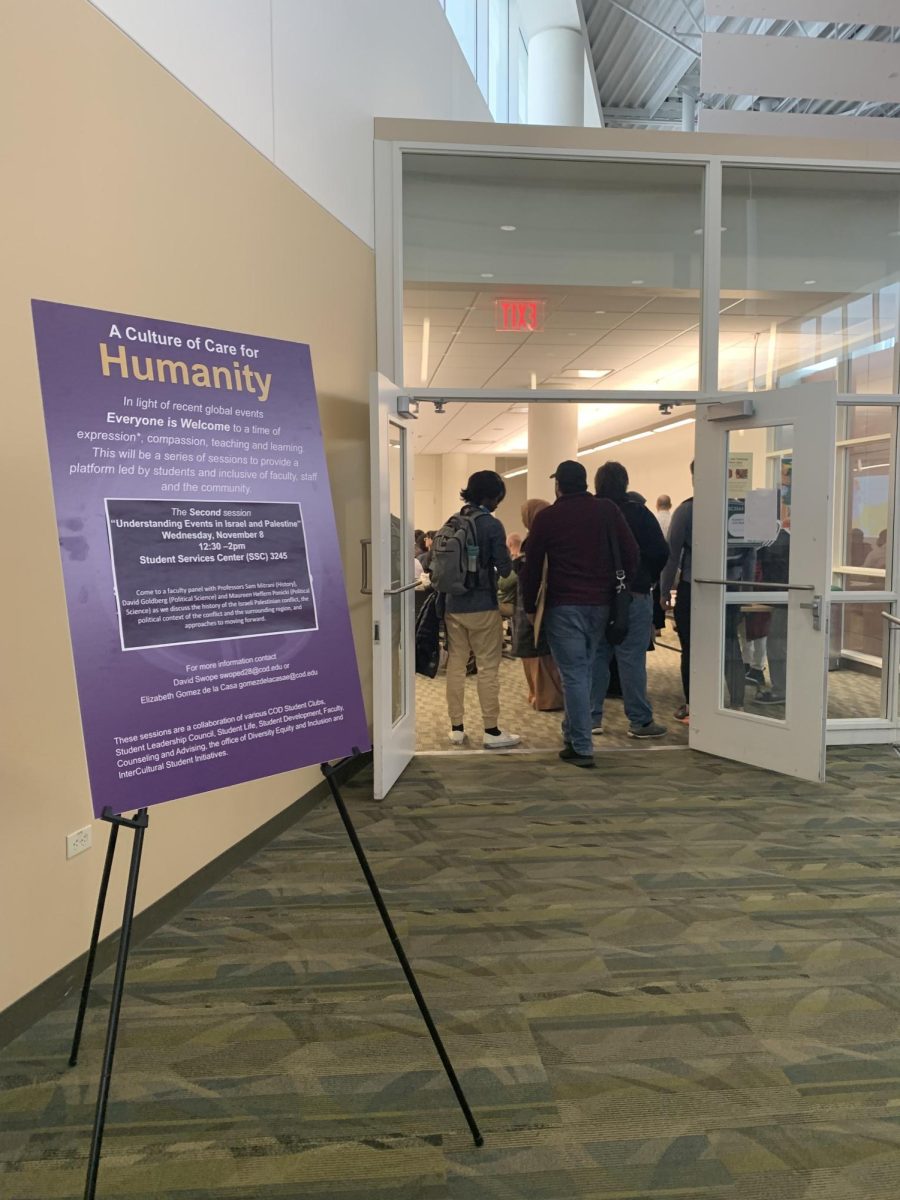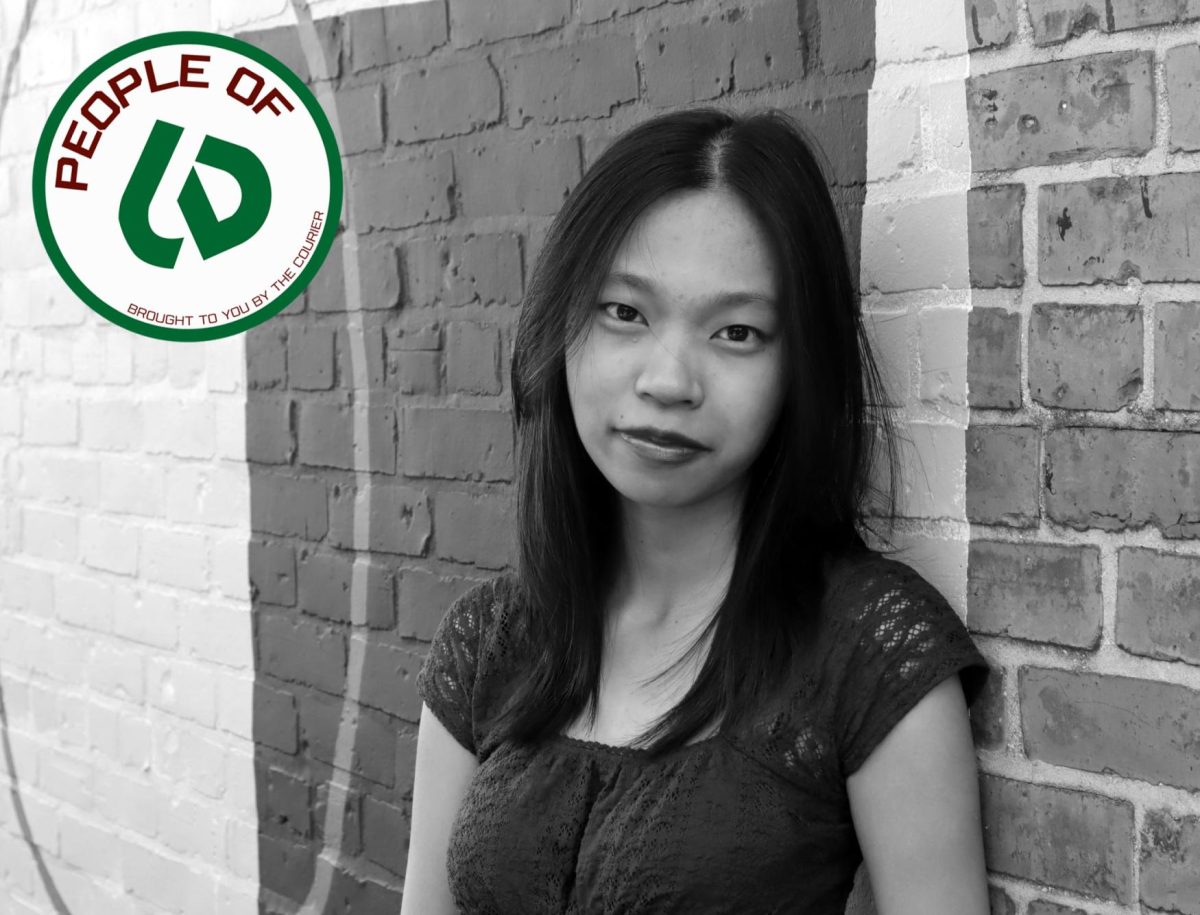College of DuPage recently hosted a faculty discussion that, according to some students who attended, fell short of expectations to elaborate on current and relevant information. The panel was entitled “Understanding Events in Israel and Palestine,” and was held in Room SSC 3245 as the second addition to their “Culture of Care for Humanity” series of events, which aims to inform people on current world events as well as promote unity and justice.
History professor Sam Mitrani, who is of Jewish heritage, began the discussion by providing a historical overview explaining how Britain and the United States contributed to the formation of Israel and the occupation of Palestinian land after the dissolving of the Ottoman Empire, which Palestine was previously part of.
This occupation, he explained, ultimately led to territory attributed to Palestinians being reduced to a “leopard-skin state” in which Palestinian land was fragmented rather than continuous. A slide presentation displayed maps of the Middle East and the gradual changes to Palestinian territory over the years as he spoke. Mitrani acknowledged the hostilities Palestinians have been subject to over many decades, as well as emphasized the tight-knit relationship between Israel and America.
“When you are talking about Israel, you are talking about the United States,” he said.
Political Science professor David Goldberg added to Mitrani’s points by making mention of additional political factors that have contributed to Palestine’s circumstances. He stated that Israel is run by a far-right government that vehemently opposes Palestinians and Jews who stand against Israeli colonization. He also made mention of how Israel has a heavy influence on Western nations as well as Middle Eastern nations such as Egypt.
Since the establishment of Israel, many nations have been reluctant to recognize Palestine as a sovereign state. As of November 2023, 138 of all 193 United Nations members acknowledge the state of Palestine, while 55 countries– including Australia, Canada, Germany, France, Japan, the United Kingdom, and the United States– do not acknowledge Palestine.
“Both [Hamas and Israel] are engaged in war crimes,” affirmed Goldberg. “Clearly, Israel is on the bigger side of this. We have a responsibility to recognize the humanity of the people that are suffering.”
Goldberg’s input was followed by a speech from political science professor Maureen Heffern Ponicki, who expressed support for a two-state solution to the Israel-Palestine situation. According to a poll conducted by the Palestinian Center for Policy and Survey Research, 61% of Palestinians and 60% of Israelis do not support a two-state solution. She urged attendees to take action by protesting peacefully and fervently. Another poll conducted by the newspaper Maariv found that 59% of Israelis are in favor of a ceasefire under the condition that Israeli prisoners of Hamas be released, whereas only 3% of Israelis support an unconditional ceasefire.
“We found that violent campaigns facing government repression are less than 20% likely to succeed, while nonviolent campaigns are more than 25% likely to succeed,” she said. “Nonviolence is strategic.”
Mitrani encouraged attendees to talk to one another, adding that being immersed in social media exposes people to algorithms consisting of bias and ideas they are more likely to agree with, which can be limiting.
After the discussion panel concluded, Heffern Ponicki shared more background information pertaining to the formation and organization of the discussion panel.
“The [purpose of the] panel is to provide students with more background information about the conflict [and] to help people understand what is going on,” she remarked. “It’s actually students who said, ‘We need to talk about this, and we need to do something.’ So a group of students, faculty and staff gathered to figure out how we can provide a space for us to discuss these issues.”
College of DuPage political science student Sahar Mojadaddi was not satisfied with the panel. She felt there was a lack of Palestinian input and representation.
“Anybody who is Palestinian was not there to talk about their perspective,” she remarked. “It was very disappointing to see that, because we are talking about Israel and Palestine and the genocide that is taking place there. I really wish there was more representation in the panel.”
Heffern Ponicki agreed.
“I think that we should have [representation of those groups],” she said. “I talked to somebody else, and I said, ‘If you know somebody [of Arab origin willing to participate], let’s put them in.’ This shouldn’t be seen as the only time that we’re discussing this. We’ve had a couple of events, but we keep on planning more.”
College of DuPage computer science student James Lamoureux, who also attended the panel, held more favorable sentiments regarding the event.
“I enjoyed the panel,” he said. “As someone relatively well-read on the issue, I learned some [new information].”
Mojadaddi voiced how the panel fell short of her expectations to hear more current, relevant information regarding the political aspect of the Palestine situation. She believed that the panelists did not adequately describe the current circumstances Palestinians are facing.
“I wanted more attention to what’s happening in Gaza and in the West Bank,” she explained. “But all I received was a history lesson in the background, not what’s happening today. Many of the panelists had said this is a conflict. This is not a conflict. It’s a genocide. In Gaza right now, schools are being bombed, hospitals are being bombed, churches and mosques that are older than 500 years are being bombed. And these are places where innocent civilians are going for safety.”
Lamoureux, on the other hand, believed that the messages of the panel were insightful and just.
“Based on the brutality of a certain side and the actions committed since 1948, I feel it was fair with some disagreements given space, even amongst the panelists,” he stated. “While in the United States, our media is consistent many times to the U.S. state department’s narratives and the narratives of U.S. allies, each educator took a firm stance against the apartheid system of the current Israeli government and gave historical and current context to justify their stances.”
Students are encouraged to attend the next event of the “Culture of Care for Humanity” series entitled “Navigating Emotions and Developing Resiliency during Global Upheaval,” which will be hosted by College of DuPage counselors on Tuesday, Nov. 14 from 12:30 to 2 p.m. at SSC 1200.







